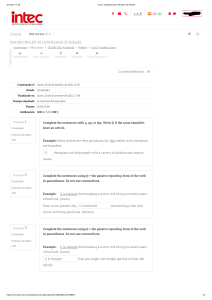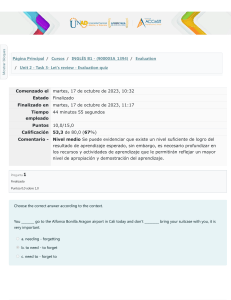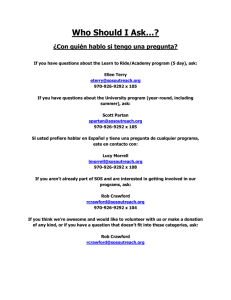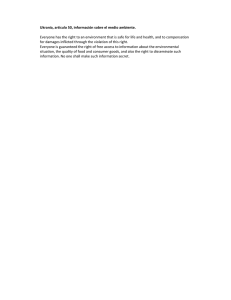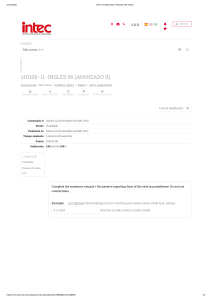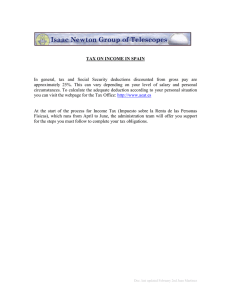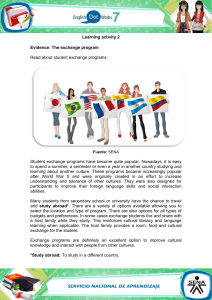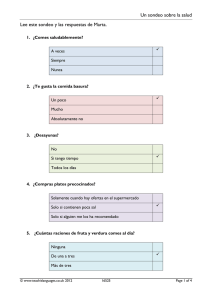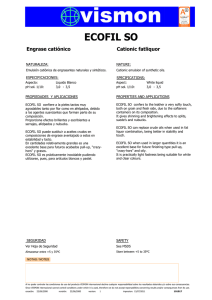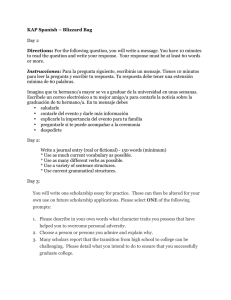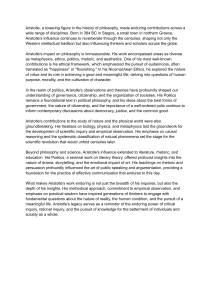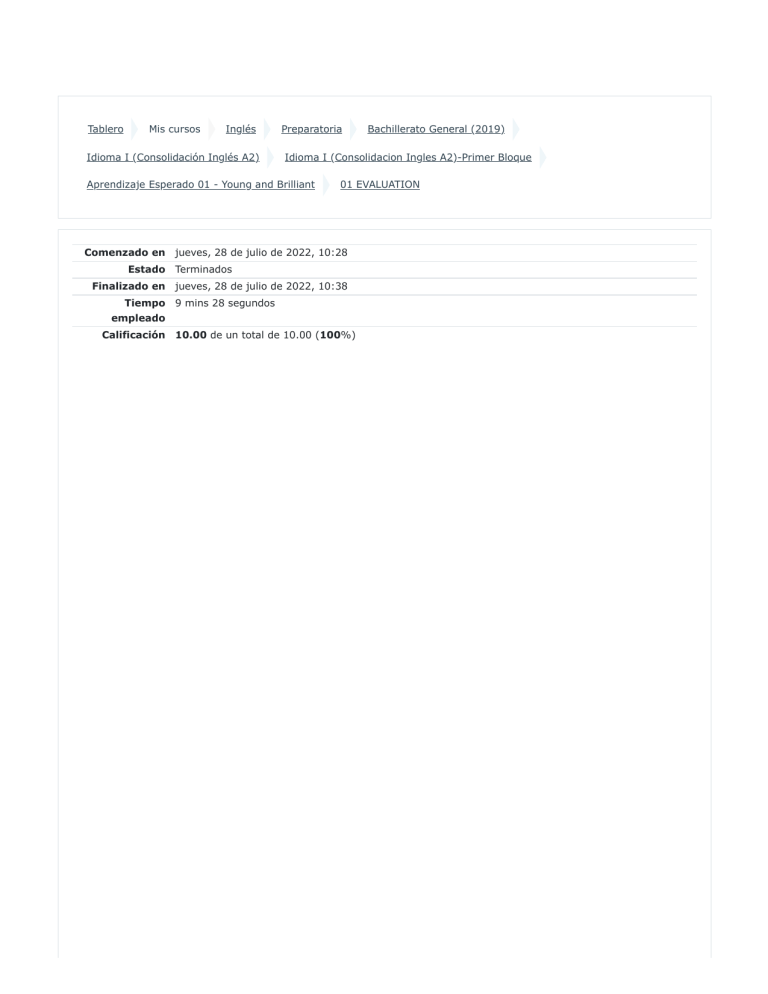
Tablero Mis cursos Inglés Idioma I (Consolidación Inglés A2) Preparatoria Bachillerato General (2019) Idioma I (Consolidacion Ingles A2)-Primer Bloque Aprendizaje Esperado 01 - Young and Brilliant 01 EVALUATION Comenzado en jueves, 28 de julio de 2022, 10:28 Estado Terminados Finalizado en jueves, 28 de julio de 2022, 10:38 Tiempo 9 mins 28 segundos empleado Calificación 10.00 de un total de 10.00 (100%) Información Evaluation Stage Objective: To examine the adolescence of 5 young people that made great contributions to science by reading about their life experience in order to recognize the importance of these events in everyday life. Suggested time: 20 min Directions: Read the text adapted from “5 Famous Scientists That Started Their Work as Young Teens” by Myers (2013). 5 Famous Scientists That Started Their Work as Young Teens Not all of history's most significant scientists were college graduates when they began their works. In fact, history is full of scientists who have shaped the world due to their work as teenagers. But, imagine if they were ignored, simply because of their age? Surely, many things we take for granted today may not exist. Through their own determination and thirst for knowledge, these teenagers impacted the world far greater than they would realize long after their deaths. 1. Isaac Newton - During Newton's formative years, it was very common to see him working on various devices and attending school at the same time. His devotion to studies and high marks in school were impressive to many. Although his mother attempted to make a farmer of him by removing young Isaac from school, the schoolmaster and his uncle suggested to his mother that he return to school to finish his education, so Isaac Newton attended Cambridge University and finished school in 1661. He developed a variety of scientific methods and discoveries including those in optics and colors. Figure 1 Master Isaac Newton in his Garden at Woolsthorpe From The Royal Institution by Robert Hanna. 1856. (https://artuk.org/discover/artworks/master-isaac-newton-in-his-garden-at-woolsthorpe-in-the-autumn-of-1665-21605) 2. Albert Einstein - In his younger years, Albert Einstein always showed interest in mathematics and science, so he attended the Swiss Federal Polytechnic examinations in Zurich. Although his scores were below standard in many of the required subjects, his mathematics and physics skills were exceptionally high. From there, Albert Einstein attended Aargau Cantonal School in Aarau, Switzerland where he graduated with passing grades in some subjects and receiving the highest grade scale possible in mathematics and physics. His theories set the basis for many scientists of today and he is most notable for the Theory of Relativity. Figure 2 A 16-year-old Einstein From CHRISTIE’S by Wolfsgruber, G.1895, (https://onlineonly.christies.com/s/einstein-family-letters-portraits/16-year-old-prodigy-4/55684) 3. Galileo Galilei - While at the University of Pisa studying for a medical degree at the age of 17, Galileo Galilei was fascinated with how movements of air currents could cause a chandelier to sway in a rhythmic pattern. Setting up a set of differentiating pendulums, Galileo discovered that, in spite of the size difference, the pendulums kept time with each other. The young man changed his degree from medical sciences to mathematics after attending a lecture on geometry. At the age of 22, Galileo published a book on the design of a hydrostatic balance he had invented. Figure 3 Galileo Galilei Younger From Sutori by C. Bradley. n.d. (https://www.sutori.com/story/galileo-galilei--nTfjkpPLCC2ZbTNHPYQQJ3EZ) 4. Aristotle - In the 3rd Century (Before Common Era), Aristotle made great contributions to almost every subject of study. At the age of 18, he attended Plato's Academy where he studied nearly every subject offered at the time. For 20 years he remained at the Academy until eventually quitting. With his vast knowledge of subject material, Aristotle had completed encyclopedias of information opening the doors for many. Figure 4 La jeunesse d'Aristote From “Wikipedia,” by Rama. (2006). (https://en.wikipedia.org/wiki/Charles_Degeorge#/media/File:Statue-Orsay-02.jpg.) 5. Blaise Pascal - Did you know that your Windows-based computer system has a tool installed that was invented 350 years ago? Blaise Pascal began work on calculating devices and prototypes at the age of 16, in 1642. Although the centuries have developed calculators that are digital, solar powered, scientific, and software-based, Pascal started the process of developing earlier versions of our calculating devices. What computer or smartphone would be complete without a calculator of some kind? Figure 5 Blaise Pascal From Encyclopedia Britannica by Hoppner 1833. (https://www.britannica.com/biography/Blaise-Pascal) As you can see, discouraging a child from using his or her imagination and exploring other possible answers to questions could have repercussions in the future of humanity. Pregunta 1 Completada Puntúa 1.00 sobre 1.00 II. Directions: Examine the questions below then, choose the correct answer. Which of the following young scientists worked on the first version of a device that now is normally included in tablets and laptops as an essential app? a. Galileo Galilei b. Isaac Newton c. Blaise Pascal d. Albert Einstein Pregunta 2 Completada Puntúa 1.00 sobre 1.00 Isaac Newton developed a variety of scientific methods and devices, however, his biggest discovery was related to: a. the movement of two objects at the same time. b. the different properties of the light to the human eye. c. how objects attract each other using external force. d. the creation of a calculator to solve math operations. Pregunta 3 Completada Puntúa 1.00 sobre 1.00 Einstein proved that you can make great contributions to the science field and being considered a genius in spite of a. not receiving the support of the whole family. b. not studying maths or physics. c. not being good at every subject at school. d. not having social skills. Pregunta 4 Completada Puntúa 1.00 sobre 1.00 According to the text, the phrase “shape the world” refers to: a. Preserve old ideas and human behaviours to teach new generations. b. Mold or influence the people, societies, and institutions on the earth. c. Reset the way people think and act about certain topics and customs. d. Impose a new society according to specific regulations and ideas. Pregunta 5 Completada Puntúa 1.00 sobre 1.00 The word “discouraging” describes a person who: a. is furious about something. b. detested to do something in particular. c. expects good things to happen. d. lost his enthusiasm or confidence. Pregunta 6 Completada Puntúa 1.00 sobre 1.00 What does the author mean with the expression “he graduated with passing grades”? a. He means that a student graduated after facing many problems at home. b. He means that a student received extra help from the teachers so that he could graduate. c. He means that a student obtained the minimum grades in order to get a school certificate d. He means that a student paid money to receive good grades and eventually graduate from school. Pregunta 7 Completada Puntúa 1.00 sobre 1.00 Aristotle’s life experience details all of the following events EXCEPT: a. Finally, at the age of 30 Aristotle decided to quit attending the academy and start teaching others. b. After a short time, he learned everything about all the subjects at the academy. c. In the end, Aristotle is still considered the biggest influence in the process of the creation of modern encyclopedias. d. When he was 18 years old, Aristotle joined Plato’s Academy. Pregunta 8 Completada Puntúa 1.00 sobre 1.00 Which of these ideas results to be TRUE about the life of Galileo Galilei? a. He combined his passion for geometry and medicine. b. He published his first book after becoming a medicine doctor. c. He explained the balance for weighing things in air and water. d. He designed the pendulum and sold his creation. Pregunta 9 Completada Puntúa 1.00 sobre 1.00 Choose the sentence that best describes the experience of Isaac Newton as a young scientific. a. A young scientist should always share his knowledge and learn from others. b. A young scientist must dedicate his life to experiment in different areas so that he can find his passion. c. A young scientist never stops inventing because, consequently, his discoveries can impact the future. d. A young scientist has to continue working on his projects although friends or family do not agree. Pregunta 10 Completada Puntúa 1.00 sobre 1.00 Which of the following sentences explains the principal idea of the text? a. The job of a scientist is to discover ideas and invent devices all the time in order to become famous and rich one day. b. Young people who want to become scientists will be misunderstood when they decide to dedicate their lives to science. c. Determination and imagination in young people should never be ignored, perhaps these are the tools a genius needs to appear. d. Good grades are important but it is more important to follow our ideas and find something you are passionate about. Actividad anterior ◄ 01 PRACTICE Ir a... Actividad siguiente 01 Complementary resources ► Mantenerse en contacto Universidad Autónoma del Estado de Hidalgo. Dirección de Autoaprendizaje de Idiomas http://dai.uaeh.edu.mx/ 771 717 2000 Ext 6052 [email protected] Resumen de conservación de datos Derechos Reservados: Dirección de Autoaprendizaje de Idiomas, Universidad Autónoma del Estado de Hidalgo, Mineral de la Reforma, Hgo., julio 2019. Actualización julio 2022. Administración: I.S.C. Gittel Marlene Tovar Galván
